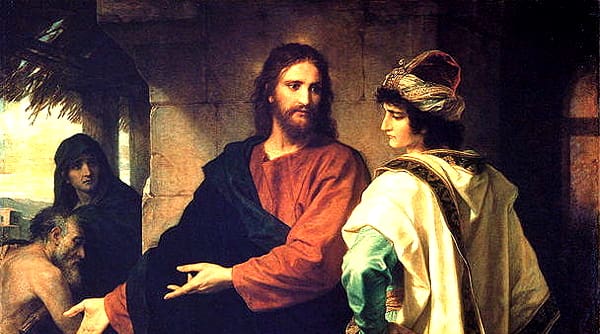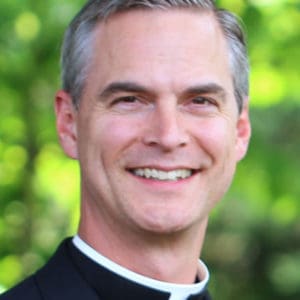What Does it Mean to Love God with All Our Strength?
Dear Father John, In the Gospel (Luke 10:27), it talks about loving God with all our strength? I know I can’t give God a bear hug in this life. So, what does loving God with all our strength mean, then?
BY LOVING GOD with all our mind, we open ourselves to receive light and guidance about the right path to take through life. Our intellect is bathed in and nourished by the truth of God’s revelation, and the ignorance and confusion we inherited from original sin is gradually corrected and purified. But knowing something is not the same as doing something.
The intellect is not the only spiritual power in human nature. We also have the power of free choice, of decision: The human intellect and the human will must work together, under the light of faith and the strengthening of grace, in order to move us forward on the path of spiritual maturity. We must know the truth more and more deeply, but we also must freely choose to act in accordance with the truth we know, and we must make that choice repeatedly, day after day, situation after situation. The wild horse of our soul must have a rider that both knows where to go and is fully determined to get there. To grow in our love for God, then, includes loving him not only with all our mind and all our soul, but also with all our strength.
The Sad Young Man
The Gospels relate a memorable encounter that vividly illustrates how a weak will can impede spiritual progress. A rich and godly young man had heard about Jesus, the wonder-working rabbi from  Nazareth. He had heard enough to come to believe in him, to believe that Jesus had the answers that his soul yearned for. And so, he went out to seek the Lord.
Nazareth. He had heard enough to come to believe in him, to believe that Jesus had the answers that his soul yearned for. And so, he went out to seek the Lord.
When he found him, he was so excited and eager that he “ran up, knelt down before him, and asked him, ‘Good teacher, what must I do to inherit eternal life?’” (Mark 10:17). This was the right question! He wanted to know the deeper truth, and he believed Jesus could reveal it to him. His mind was
open to the light.
Jesus recognized this and engaged in a conversation with him. He first told him to follow the commandments, since those were the path to fulfillment built right into human nature. But the young man replied that he was faithful to the commandments, and he wanted to know what else was missing, because he felt that his heart was still empty in some way. Again, we see that his mind was open to the light of truth; his conscience was making solid judgments and pushing him toward deeper immersion in God’s revelation.
At that point, Jesus, “looking at him, loved him and said to him, ‘You are lacking in one thing. Go, sell what you have, and give to [the] poor and you will have treasure in heaven; then come, follow me’” (Mark 10:21). Jesus gave him the answer. Jesus revealed to this sincere and well-instructed young man what was holding him back: an inordinate attachment to his wealth, and to the comfort and the apparent self-sufficiency that wealth brings. Jesus showed him the true path to deeper communion with God. The young man now knew the truth about how he could take the next step toward spiritual maturity.
In the man’s response to this illumination, the Scriptures reveal the most common obstacle to spiritual growth, a weak will, a will enervated by inordinate attachments. St. Mark describes how the young man reacted to the answer he had been so avidly seeking: “At that statement his face fell, and he went away sad, for he had many possessions” (Mark 10:22). This man’s capacity to choose the true good, his freedom—the precious gift we receive in order to enable us to love consciously and dynamically what is good, as persons, and not simply to follow unconscious instincts, like the rest of the animals—was hampered. He was not free to follow the higher good, the good he knew and desired, because his will was enchained, at least in part, to a lesser good.
The True and the Good
Jesus always linked knowledge of the truth with action in accordance with that knowledge. In his conversations with the Jewish leaders of his time, as well as his conversations with his own disciples, he repeatedly emphasized this connection. It is not enough to know and believe God’s truth in the abstract; we must also choose to act and live in harmony with our faith—otherwise our union with God is impaired, and our wills remain divided and separated from God’s will. And in fact, even knowledge of God’s revelation remains immature without a growing obedience to that revelation:
Jesus answered them and said, “My teaching is not my own but is from the one who sent me. Whoever chooses to do his will shall know whether my teaching is from God or whether I speak on my own.” (John 7:16–17)
The spiritual life, as Jesus has revealed it, consists not merely of some secret or magical knowledge, as many non-Christian religions and heresies have asserted through the centuries. Rather, the spiritual life, the life of grace and growth in holiness, is an interpersonal relationship. More than just learning about God, it involves getting to know God. And getting to know someone means walking with them and living at their side, not only sharing common knowledge, but sharing life with them, being united in thought as well as in will, in both our spiritual faculties.
Jesus himself made this starkly, even frighteningly, clear at the end of his Sermon on the Mount. After pouring out his instruction, his light, his revelation regarding God and regarding the path to true happiness, he wraps things up with a stern warning against being satisfied with a mere knowledge about those things without advancing, through obedience, to a knowledge of them:
Not everyone who says to me, “Lord, Lord,” will enter the kingdom of heaven, but only the one who does the will of my Father in heaven. Many will say to me on that day, “Lord, Lord, did we not prophesy in your name? Did we not drive out demons in your name? Did we not do mighty deeds in your name?” Then I will declare to them solemnly, “I never knew you. Depart from me, you evildoers.” (Matthew 7:21–23)
The bridge between knowing and doing is built only by the spiritual power of our will. Engaging this power in our relationship with God is how we come to love him with all our strength.
Editor’s Note: This is another excerpt from Father John Bartunek’s new book “Seeking First the Kingdom” filled with “practical examples and down-to-earth wisdom which will show you how to bring Christ into each facet of your life”. Click here to learn more about the book…or if you wish to get it for a friend or relative who doesn’t read on line.
+
Art for this post which asks what it means to love God will all my strength: Christ and the Rich Young Ruler, Heinrich Hoffmann, 1 June 1889, PD-US, Wikimedia Commons. The Sermon on the Mount, Carl Heinrich Bloch, 1877, Restored Traditions, used with permission.





